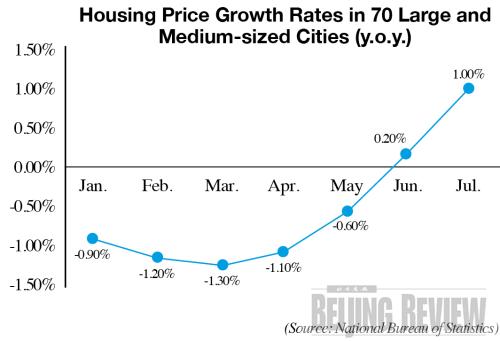| 
Numbers of the Week
15.6 billion yuan
Bank of Communications Ltd., one of the largest mainland-based commercial lenders, on August 19 reported a net profit of 15.6 billion yuan ($2.3 billion) in the first half this year, up 0.3 percent year on year.
300 billion yuan
China's shipbuilding enterprises reported a total output value of 300 billion yuan ($44 billion) in the first seven months of this year, the Ministry of Industry and Information Technology said.
TO THE POINT: The China Banking Regulatory Commission has kick-started a pilot program to bolster consumer finance companies. This marks a step forward in the economic shift toward consumptions. In June, China trimmed a record net $25.1 billion in holdings from U.S. Treasury securities on concerns over the value of U.S. dollar assets. Air China Ltd., one of the country's big three carriers, meanwhile, plans to raise its stake in Cathay Pacific Airways Ltd. to nearly 30 percent. China's foreign direct investment inflows, at the same time, continued to decline in July, but its long-term prospects remain intact. The China Investment Corp. generated $23.1 billion in net profits last year and its return on registered capital was 6.8 percent.
By HU YUE
Bucking up Consumption
Having reeled from a serious contagion in the U.S. consumer market, China obviously does not want to experience one of its own. The speed with which the country steps up incentives for consumers has provided a level of comfort that the pro-consumption rebalancing will quickly get underway.
Following a series of policy moves to repair the social safety net, the China Banking Regulatory Commission (CBRC) recently launched a pilot program to set up four consumer finance companies in Beijing, Shanghai, Tianjin and Chengdu, respectively.
The companies can extend non-guaranteed short-term small loans for purchases of durable consumer goods, excluding autos and properties. To keep bad loans at bay, the CBRC capped once-off debt less than five times of the borrower's monthly salary.
Analysts believe the pilot program is on track to strengthen the consumer market's ability to prosper, and help wean the economy off heavy reliance on exports and investments.
The lending tap can be easily switched on and off. But at a time of wage stagnation and looming unemployment, forcing consumers to spend money hand-over-fist may be a tough job. Worse still, the U.S. financial meltdown has left many Chinese consumers wary of overextending themselves and spending borrowed money.
A survey made by the People's Bank of China, the central bank, for example, showed that readiness of Chinese citizens to consume hit a record low in the second quarter.
China's rapidly urbanizing economy still has ample room to expand consumption, said Cai Zhizhou, a senior economist at Peking University, in a statement. But the current priority is to increase income of the poor households and jumpstart the rural markets, he said.
Off loading U.S. Treasuries
China trimmed a record net $25.1 billion in holdings off U.S. Treasury securities in June, or by around 3 percent, but the country remains the largest foreign holder of the U.S. Government debt.
Beijing loads up U.S. dollar assets due to its enormous trade surplus. Foreign holdings are also important for the United States, which faces a heavy budget deficit. By the end of July, meanwhile, China's forex reserves had stood at more than $2.13 trillion, with the bulk parked in the low-yielding Treasury securities. China has expressed concerns about the safety of its investments, given the quantitative easing that threatens to inflate away the value of dollar holdings.
| 